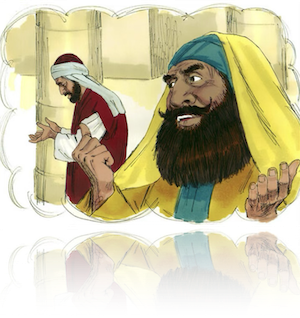
30th Sunday C
Robert Chiesa SJ

The Pharisees were deeply religious observers of the Torah, the Mosaic Law. They were highly respected by the people and were eagerly awaiting Israel’s deliverance from foreign domination by Rome. But many of the Pharisees were so fervent about fasting and giving alms that they tended to look down on others who were not so fervent. So they could seem arrogant and have a sense of superiority.
Jesus picks out one of these for his story and has him praying in the temple. He is standing up front and, while offering thanks to God, he is also congratulating himself. His prayer is full of “I do this,” “I do that,” and he thanks God that he is not like others, especially that publican, that tax collector back there. We must remember that tax collectors were generally despised because they were working for both the oppressive Roman government and the local authorities. They were known for cheating by overtaxing and taking a margin for themselves.
Such was the tax collector in today’s parable, and his prayer is different from that of the Pharisee. The tax collector stays off in the distance and cannot even look up to the Lord, but beats his breast, admits his sinfulness, and begs for mercy. Note that he does not utter any words of conversion. He is caught in his profession and cannot abandon it. But God loves him as he is, aware of his own lack of cleanliness.
Luke started off by telling us why he quotes this parable. It is about people who are proud of themselves and look down on others. And at the end, he sums it up by saying that those who lift themselves in their own eyes will not be regarded as such by God. It is the simple, humble heart that wins God’s favor. As was said in the first reading, “The prayer of the humble pierces the clouds, and it will not rest until it reaches its goal.”
So, where do we locate ourselves within Jesus’ parable? We come to church and we gather here with all kinds of people, old and young, rich and poor, polite and perhaps even rude. Do we church-goers avoid or scorn others in our own congregation? Do we pick up trash left on the floor without feeling it is below our dignity or without blaming someone else for it? Do we show respect and concern for the people in the marketplace who provide for the food and clothing, and other supplies that we need?
None of us is completely free of pride. There may be a bit of the Pharisee in each of us. Let’s acknowledge that humbly and beg for mercy. At the same time, let us also try to show the mercy and compassion of Jesus in the way we pray and in the way we interact with others in church and in town.
October 26, 2025 St Ignatius 4:30 pm.
